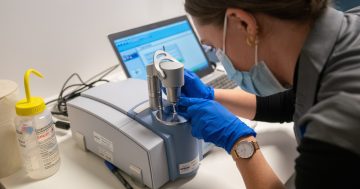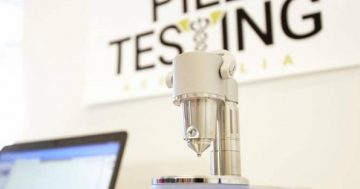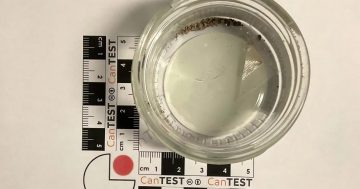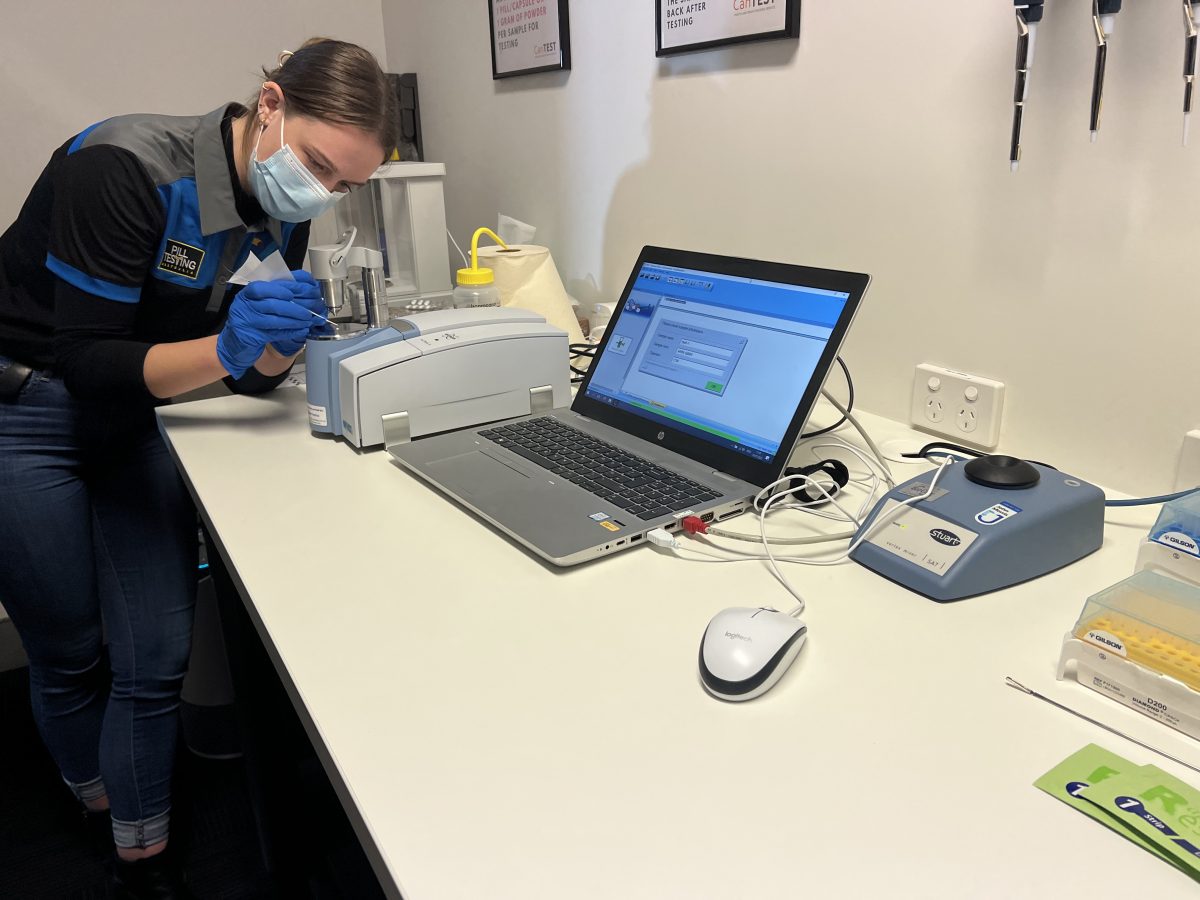
Chemical analyst Cassidy Whitefield shows how drugs are tested at the country’s first fixed pill testing site. Photo: Lottie Twyford.
Supporters of Canberra’s drug-testing facility have hailed it a success after just three weeks with the centre doing all it promised and more.
The CanTEST Health and Drug Checking Service opened at the City Community Health Centre at 1 Moore Street on 21 July.
It’s a free service, designed to save drug users from ending up in hospital (or worse) after taking a pill or injection they thought was ‘safe’.
Potential users bring along a small quantity of the substance they intend to take to have it chemically analysed in a process that takes around 15 minutes.
It’s not just drugs traditionally thought of as party drugs, either. Liquid and other forms of drugs can also be tested.
CanTEST follows on from a pill-testing pilot program at the Groovin the Moo music festival. It’s funded by ACT Health in partnership with the Canberra Alliance for Harm Minimisation and Advocacy (CAHMA) and Pill Testing Australia.
It’s open on Thursdays from 10 am to 1 pm and Fridays from 6 pm to 9 pm.
ANU Medical School lecturer and Pill Testing Australia chemical lead Dr David Caldicott says there has been a steady flow of drugs for testing.
“We’ve deliberately organised a soft start to test our systems because, obviously, it’s a little cooler and not the middle of the party season at the moment.”
Unlike the pilot program, CanTEST now tests injectable drugs, giving ACT Health and the analysts from the ANU Research School of Chemistry a holistic view of what drugs are on our streets.
“We’re getting information about the types of drugs that are commonly injected while on the lookout for the highly potent fentanyls that have tainted the market overseas,” Dr Caldicott says.
“It’s every bit as interesting as we thought it would be.”
Fentanyl has yet to be presented for testing, but variations of MDMA (methylenedioxymethamphetamine) are popping up.
“It’s been all the way from really poor quality stuff – like that from the 1990s and 2000s – to crystalline MDMA that’s very pure. There’s quite a range out there.”
Cocaine and ketamine are regulars, although, like MDMA, ketamine is coming in different forms and with different effects.
Of particular interest to Dr Caldicott’s team is a compound called ‘phenibut’.
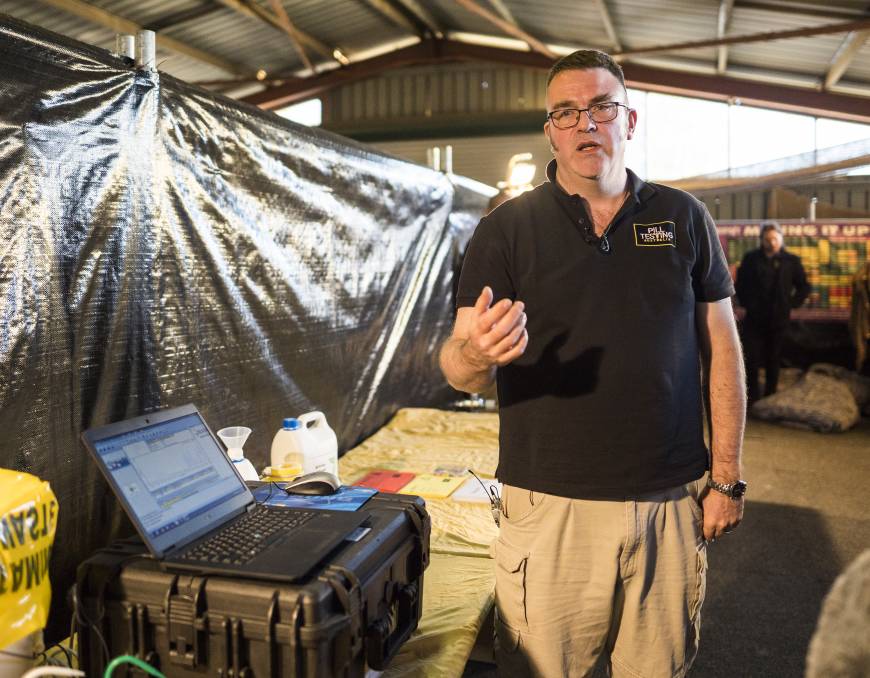
Dr David Caldicott inside the pill testing site at Groovin the Moo festival in 2019. Photo: Pill Testing Australia.
“[Phenibut] was used by cosmonauts in the Soviet Space Program as a nootropic, or cognitive enhancer,” he explains.
“Supposedly, and obviously incorrectly, it’s a drug that is meant to make you smarter and quicker thinking. It’s illegal in Australia but it is used as a health food supplement elsewhere.”
In addition to providing the analytical equipment, the ANU Research School of Chemistry designed a warning system.
Whenever a drug raises a yellow alert, Dr Caldicott says it is flagged with ACT Health and other responding groups so they know it’s out there and how to respond if it presents at the Emergency Room or Walk-in Clinics.
“We have had a series of yellow alerts, but they’re more for the purposes of people knowing what’s out there. There have been no red flag drugs to date.”
Dr Caldicott says the biggest hurdle the testing centre faces is alleviating fears it’s “some kind of honey trap”.
“I think a lot of people are concerned we’re working or colluding with people who might have hostile intent,” he says.
“Once more people notice we’re here to help, the numbers will increase.”
When it opened, ACT Minister for Health Rachel Stephen-Smith responded to criticism that free pill testing was encouraging drug usage, saying the service would not be telling a user the drug they were “already intending to take” was safe.
“That is not the message … it’s about identifying substances that are unexpected and providing advice to people about the harms associated with drugs and how they can reduce them,” she said.
Dr Caldicott says this approach is working and that people are abandoning the drugs as soon as they find out it’s not what they expected.
“Perhaps most importantly, people who haven’t had a grown-up conversation with an expert about their drug consumption are having those conversations for the first time with us, people they know they can trust for information.”
He says CanTEST is now looking at ways to expand the operation as warmer weather approaches.
“We’re not resting on our laurels – we know this is going to get busier as the reputation spreads, but it’s the start we wanted.”












